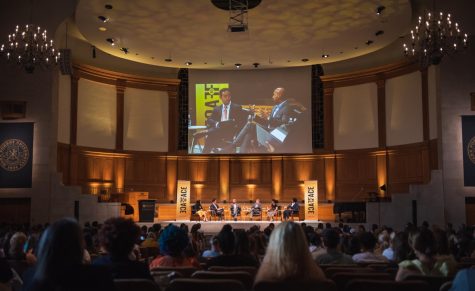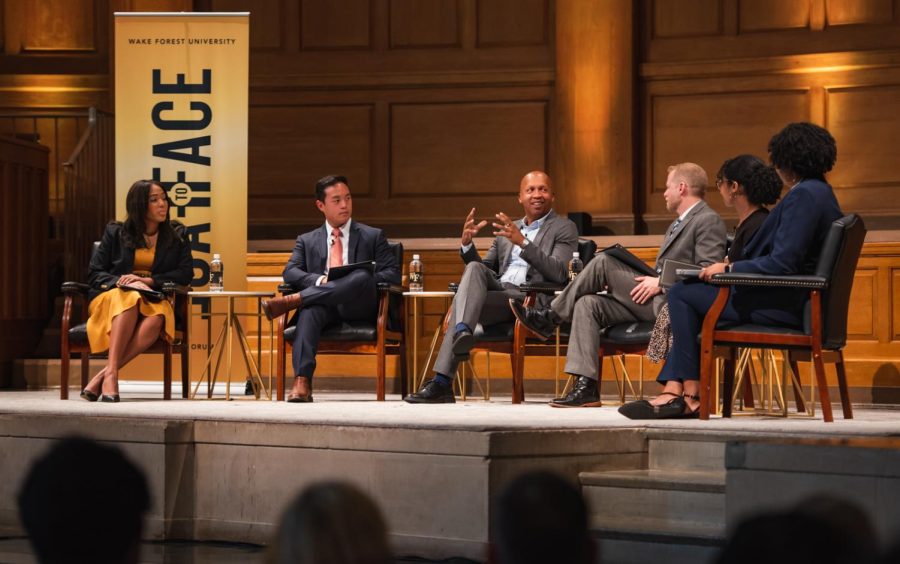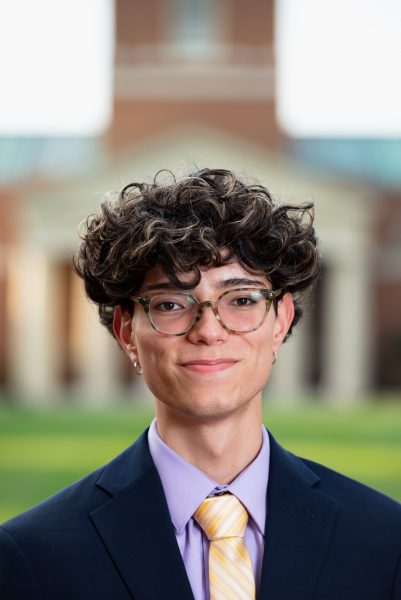Bryan Stevenson urges students to fight for justice
The author and social justice activist shares the importance of proximity
February 27, 2023
Proximity is a core tenant of social justice activist Bryan Stevenson’s work — one he shared with members of the Wake Forest community in Wait Chapel on Feb. 23 in the third installment of the Face to Face Speaker Forum.
“We have to get proximate to people in need, wrap our arms around them and affirm their humanity and dignity,” Stevenson said.
Stevenson, the prolific author of The New York Times bestseller “Just Mercy: A Story of Justice and Redemption,” is the founder and executive director of the Equal Justice Initiative (EJI), a nonprofit organization that provides legal representation to people who have been falsely convicted, unfairly sentenced or abused by the prison-industrial complex. He participated in two events, a student-only event at 5 p.m. and a community-wide event at 7:30 p.m.
EJI also provides reentry services to formerly incarcerated people and is openly opposed to the death penalty — which became a topic of national discussion earlier this month.
During the forum, Stevenson shared how he found his sense of purpose during his time at Harvard Law School. He was required to spend a month serving a human rights organization and providing legal services to individuals on death row in Jackson, Georgia. There he met an incarcerated man who, while being led back to his prison cell, began to sing.
“This man closed his eyes, threw his head back and started to sing a hymn on reaching higher ground,” Stevenson said. “You would hear the chains clanging as the guards pushed him down the hall but you could also hear this man singing … when I heard that man singing, that’s when I knew I wanted to help condemned people reach higher ground.”
He continued: “If I’ve had any impact as a lawyer, it’s not because I’m smart but because I got proximate to a condemned man and heard his song. I think people are singing all over the world and if we get close enough to hear their songs, we can become a part of that song.”
Proximity is not just for lawyers, or even professionals. Stevenson gave advice to Wake Forest students on getting proximate. He shared that through proximity, one can develop a sense of clarity and purpose.
“Clarity is hard to come to on your own. You’ve got to get proximate to the people you care about. You’ve got to get to proximate to the communities you want to serve,” Stevenson said. “For me, getting proximate to the condemned brought me an immense sense of clarity.”
Sophomore Hannah Elluru was particularly struck by Stevenson’s message.
“The injustices of the criminal justice system and Stevenson’s commitment to his work moved me,” Elluru said. “Because of him, I feel like I have found my purpose. I want to help those whom the law has been unkind and unfair to and use Stevenson as my example. It sounds so cliché, but he truly has changed my life for the better.”
Stevenson explained that the connections he has made with incarcerated individuals have revealed areas in his life he describes as “broken.” He discussed how his work has impacted his view on grace and healing.
“I work in a broken system,” Stevenson said. “My clients have been broken by poverty, broken by trauma, broken by addiction. But I do what I do because I am broken, too. The truth is that I am not just trying to save my clients, I am trying to save myself as well.”
He continued: “It is the broken people who can teach us what grace is about — what it means to be put back together.”

Alongside discussing the injustices many incarcerated individuals face, Stevenson explained how the legal system must reckon with its history.
“When mobs were forming and terrorizing and lynching thousands of Black people, prosecutors chose not to hold accountable the perpetrators of that violence,” Stevenson said. “For the first half of the 20th century, prosecutors were complicit in racial terror.”
Stevenson offered advice to individuals who aspire to become prosecutors. One such student, Dareus Chen, got to ask Stevenson two questions during the 5 p.m. event and connected with Stevenson through a shared passion for justice.
“Stevenson’s work is interwoven with my academic and social direction because I plan on going into prosecution after graduating from law school,” Chen said. “I believe that this kind of work is a never-ending battle that has to be maintained.”
Many students described the impact Stevenson’s talk had on their academic career and the Wake Forest student body. Junior Emily Oh explained how Stevenson’s emphasis on proximity challenges students to use their academic and professional careers to become advocates for others.
At Wake Forest, proximity is “very relevant to Pro Humanitate,” Oh said. “Most of us are very privileged students, and we can all learn how to use our future careers to advocate for others in corporate, legal and professional settings.”















